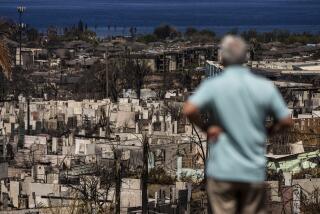India Gas Survivors Facing Less Trouble Than Feared
- Share via
WASHINGTON — Survivors of the poisonous gas cloud that swept over Bhopal, India, are suffering far fewer lasting health problems than was first feared, but the lives of thousands still may be shortened by chronic lung disease and other respiratory problems, two U.S. doctors who investigated the tragedy said Thursday.
The doctors said the health outlook is especially uncertain for children under age 8, whose lungs were not fully developed when the cloud of deadly methyl isocyanate gas spewed from a Union Carbide Corp. pesticide plant on Dec. 3.
Gareth Green and Jeffrey Koplan, members of a four-man medical team that the U.S. government sent to Bhopal shortly after the disaster, said many of those injured by the corrosive gas appear to be recovering well.
Most of the estimated 2,000 deaths from the gas occurred in the first two days after the accident. Doctors do not expect a steady stream of additional deaths in the coming months, Green, a Johns Hopkins University public health scientist, said at a Baltimore news conference.
In addition, many of the thousands initially blinded by the gas are recovering their sight and appear “unlikely to have long-term problems,” said Koplan, assistant director for public health practice at the U.S. Centers for Disease Control. Koplan, interviewed by phone from his Atlanta office, led the U.S. team.
Both Koplan and Green said it seems more likely that lung damage from the gas will be long-lasting for at least some of the 100,000 to 200,000 Indians who are estimated to have been in the gas cloud’s path.
“Because the gas methyl isocyanate is a highly active compound that immediately attaches to the lining of the lungs, we expect to see pulmonary edema (fluid in the lungs), acute respiratory disease and an increased experience of less serious bronchial disorders,” Green said.
“To say how much disease there will be--some, or none--is a matter of pure hypothesis,” Koplan said. “But the types of problems we found suggest . . . there may be some residual effects, generally what we call chronic pulmonary disease.”
The lasting effects could range from shortness of breath to increased susceptibility to other respiratory diseases such as the flu, Koplan said. Any such problems could shorten the life spans of injured Indians, but doctors still are uncertain whether gas-related lung problems will worsen or grow less severe.
More to Read
Sign up for Essential California
The most important California stories and recommendations in your inbox every morning.
You may occasionally receive promotional content from the Los Angeles Times.













